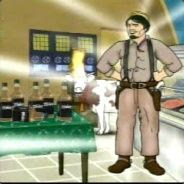Well, using "I like it" to *deny* there are errors and inconsistencies is definitely wrong. But if you like a book, you're more likely to look for ways to explain the text so there *aren't* any inconsistencies. I think there's a greyer area there than "the text is right" or "the text is wrong".loremaster wrote:I half agree, preek ive encountered thus far do find it hard to separate "i like it" from "its good, and scientifically accurate". However, to use "i like it" as your motivation for trying to justify what are clearly errors and inconsistencies is wrong.
I guess I'm starting to understand why a lot of the preeks think we get hung up on the details, and nitpick what *they* think are good books that they enjoy. To me, whether the book is well written and consistent with Dune (and itself) *determines* whether I think the book is good. So talking about the inconsistencies explains why I don't like the book (among many, many other reasons). For them, they seem to like the books for other reasons, and then either ignore or try to explain the inconsistencies and bad writing.
Dunno what I'm trying to say here. Maybe that there's always *some* interpretation of the text required, and that how much leeway you're willing to give the author depends on how you feel about the book generally.
The new Dune books still suck though. Just to be clear.
HBJ































